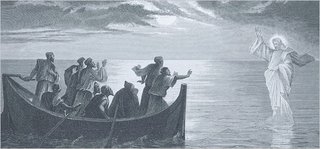Banana Epiphany
 I was craving a snack. I sat in the warm sunshine reading, but my gut was growling at me. I went into the Student Union on campus and surveyed the offerings. Mostly junk food.
I was craving a snack. I sat in the warm sunshine reading, but my gut was growling at me. I went into the Student Union on campus and surveyed the offerings. Mostly junk food.I've been dwelling lately on the sad fact that man is becoming further and further removed from nature. This alienation results in an unfortunate by-product -- distance from God. Nature puts God before the mind. Human artifacts put man before the mind.
So, in a fit of health-consciousness, I bought a banana. I peeled it and sunk my incisors into the pastel-yellow goodness. It was firm and a little tart -- just the way I like it. Suddenly, this snack became a spiritual experience. GOD CREATED THIS. A Snickers bar is man-made, and not necessarily intended for my good. If contemplated at all, the Snickers puts man before the mind. The banana is FROM GOD. I felt close to Him, as I enjoyed it, and I could almost sense the glory that emanated from the experience. I think God smiles when we enjoy what he has made for us.
Am I crazy?






